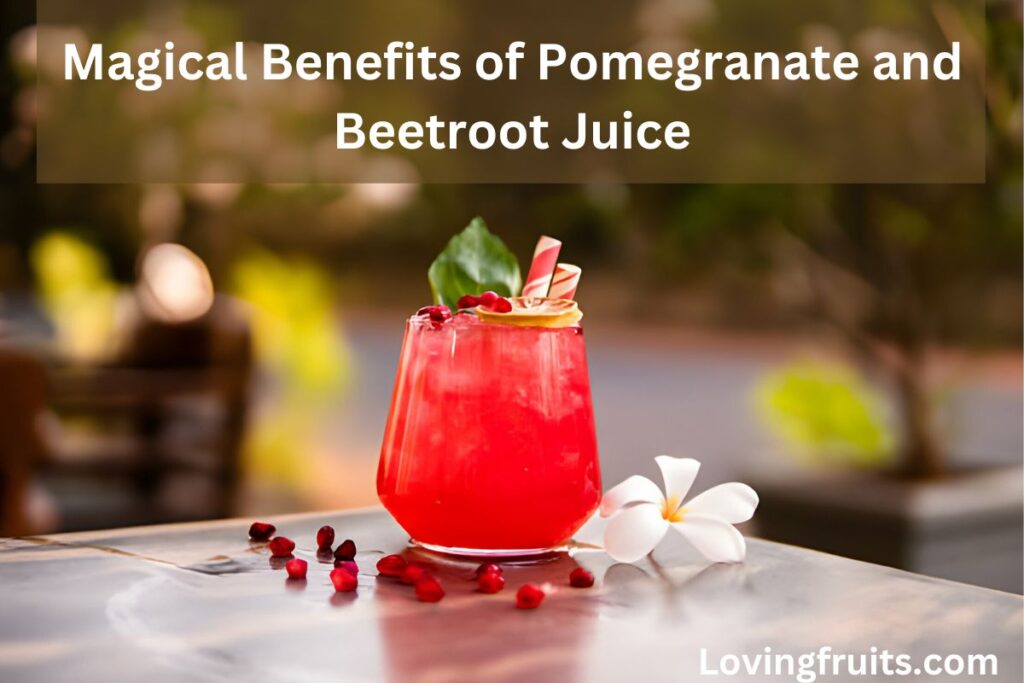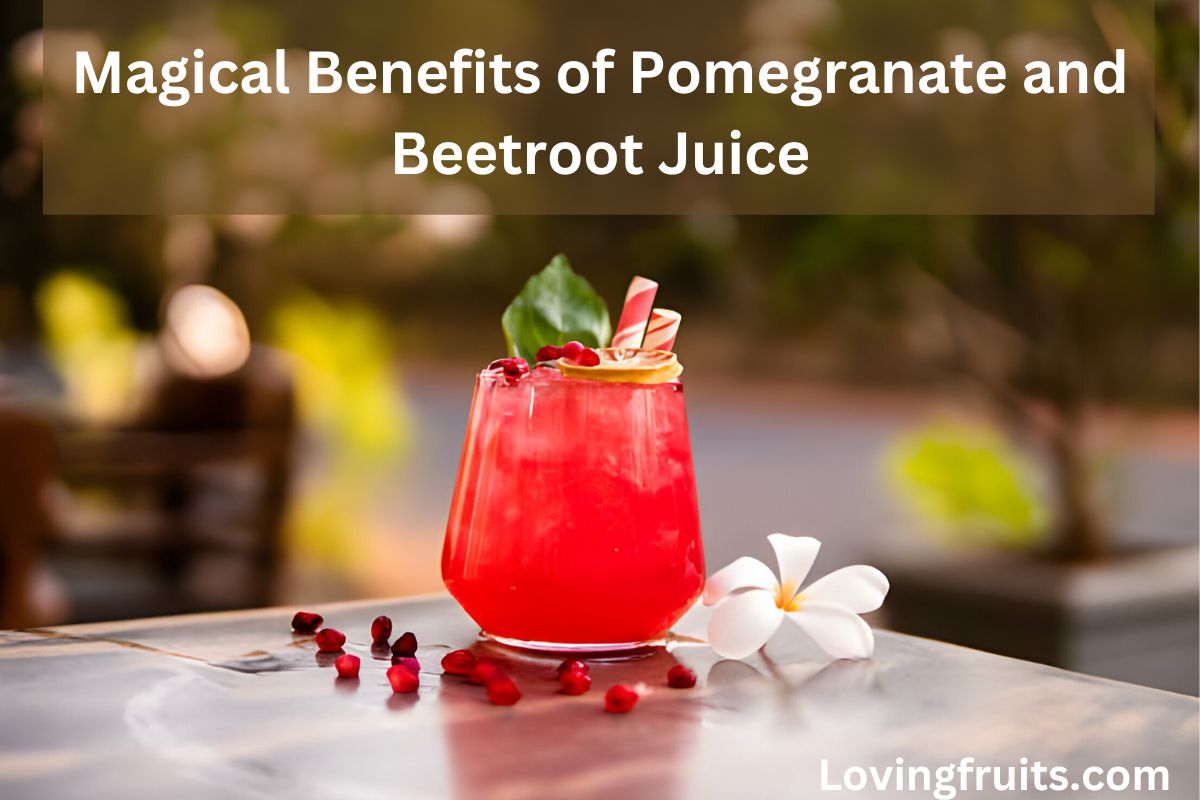
Beetroot and pomegranate juices are both full of nutrients and offer great health benefits. In this article we will discuss some of the potential benefits associated with consuming beet pomegranate juice , calories in pomegranate and beet root juice and the ideal time to drink beetroot and pomegranate juice.
Beetroot Juice Health Benefits:
1. Rich in Nitric Oxide:
Beetroot is a good source of dietary nitrates, which the body can convert into nitric oxide. Nitric oxide helps relax blood vessels, improving blood flow and potentially supporting cardiovascular health.
2. Blood Pressure Management:
Due to its nitrate content, beetroot juice may contribute to the reduction of blood pressure, which can have positive effects on heart health.
3. Exercise Performance:
Some studies suggest that the nitrates in beetroot juice may enhance exercise performance by improving oxygen utilization and increasing endurance.
4. Anti-Inflammatory Properties:
Beetroot contains antioxidants and anti-inflammatory compounds that may help reduce inflammation in the body.
5. Rich in Nutrients:
Beetroot is a good source of vitamins and minerals, including vitamin C, folate, potassium, and manganese.
Pomegranate Juice Health Benefits:
1. Rich in Antioxidants:
Pomegranate juice is high in antioxidants, particularly anthocyanins and ellagitannins which help combat oxidative stress and reduce inflammation.
2. Good For Heart Health:
Pomegranate juice may have a positive impact on heart health by reducing cholesterol levels, lowering blood pressure, and improving overall cardiovascular function.
3. Anti-Inflammatory Properties:
The anti-inflammatory compounds in pomegranate juice may benefit conditions associated with inflammation, such as arthritis.
4. Cancer Prevention:
Some studies suggest that pomegranate juice may have potential cancer-fighting properties, particularly in relation to prostate and breast cancers.
5. Boots Memory and Cognitive Function:
There is evidence to suggest that the antioxidants in pomegranate juice may have a positive effect on memory and cognitive function, potentially reducing the risk of age-related cognitive decline.
6. Aids Digestion:
Pomegranate juice may positively affect digestive health by promoting gut health and reducing inflammation in the digestive tract.
Important Considerations:
Both beetroot and pomegranate juices can be naturally high in sugars. It is important that you consume beetroot and pomegranate juice in moderation without adding any sugar.
Is beetroot and pomegranate juice safe during pregnancy?
The pomegranate beetroot juice is generally safe for consumption during pregnancy, as both can provide essential nutrients and antioxidants. However, one must consider that both these juices are naturally high in sugars. Furthermore, excessive sugar intake can contribute to gestational diabetes and other health issues. So, always drink beetroot and pomegranate juice in moderation with no added sugars.
Any person has different tolerances to certain foods and fruits. If you haven’t consumed beetroot or pomegranate juice before or if you have any concerns, it’s advisable to introduce them gradually and monitor your body’s response. Always consult with your healthcare provider and discuss your dietary choices to know about the specific considerations related to pregnancy.
What is the best time to drink beetroot and pomegranate juice?
The best time to drink pomegranate and beetroot juice can depend on individual preferences, health goals, and lifestyle factors.
Best time to drink Pomegranate Juice:
The perfect time to drink pomegranate juice is in the morning. It can be refreshing and provide a nutrient boost to kick-start your day.
Some people prefer to consume pomegranate juice as a mid-morning or afternoon snack. It’s a healthier alternative to sugary snacks and can help keep you hydrated. Consuming it before a workout may be beneficial due to its potential to enhance blood flow and provide antioxidants that could support exercise performance.
Best time to drink Beetroot Juice:
Drinking beetroot juice before exercise is a great choice. The nitrates in beetroot can convert to nitric oxide, which may improve blood flow and oxygen delivery to muscles, potentially enhancing endurance. You can also consume it as an afternoon drink to get natural energy as it may help to combat fatigue as well. When you drink beetroot juice after a workout then it aids in muscle recovery. It reduces muscle soreness making it a suitable choice. You can consume beetroot juice on an empty stomach or with any meal. The choice is all yours.
How many calories are there in pomegranate and beetroot juice?
The calorie content of pomegranate and beetroot juice can vary depending on the specific ingredients used and whether any additional ingredients, such as sweeteners, are included. Additionally, the serving size will impact the overall calorie count. Here’s a general idea of the calorie content in 8 ounces (240 milliliters) of unsweetened pomegranate and beetroot juice:
Pomegranate Juice:
Unsweetened pomegranate juice typically contains around 130-150 calories per 8-ounce (240-milliliter) serving. The calorie count can vary based on the brand and whether the juice is 100% pure or a blend.
Beetroot Juice:
The calorie content of pure beetroot juice is similar to that of pomegranate juice. An 8-ounce (240-milliliter) serving of unsweetened beetroot juice can contain approximately 70-80 calories. However, this can vary based on factors such as whether the juice is fresh-pressed or commercially processed.
If you are concerned about the calorie content or have specific dietary goals, consider choosing unsweetened varieties or diluting the juice with water to reduce calorie intake.
Is pomegranate and beetroot juice good for weight loss?
Pomegranate and beetroot juices can be part of a healthy diet and may offer certain benefits that could potentially support weight loss. However, it’s essential to approach these juices as part of an overall balanced and calorie-conscious eating plan. Similar to pomegranate juice, unsweetened beetroot juice is relatively low in calories. Choosing low-calorie beverages can be part of a weight-conscious approach.
Are there any serious beetroot juice side effects?
Beetroot juice is generally considered safe for most people when consumed in moderate amounts as part of a balanced diet. Consuming beetroot juice can cause a temporary discoloration of urine and stools. This is due to the presence of pigments in beets and is not a cause for concern. Remember that if you have a history of kidney stones or are at risk for them, you may want to limit your intake of oxalate-rich foods, including beets as it can contribute to formation of kidney stone sin some individuals. Consuming large amounts of beetroot juice may cause gastrointestinal discomfort in some individuals. So, always start with a small amount to gauge your tolerance if you are new to beetroot juice. It is advised to consult with your healthcare provider before incorporating beetroot juice into your routine.




